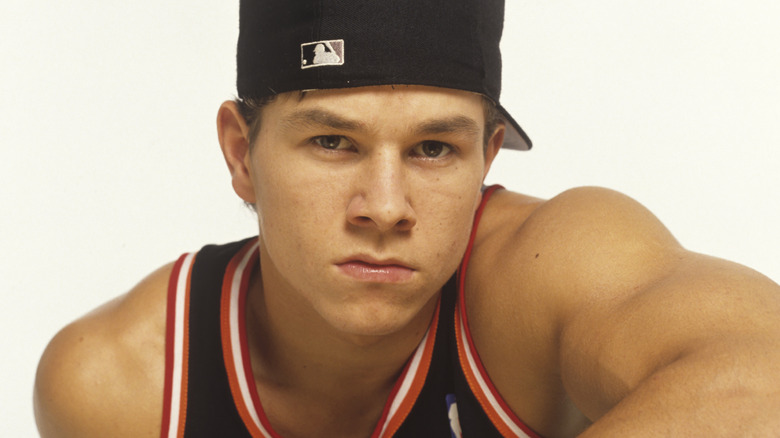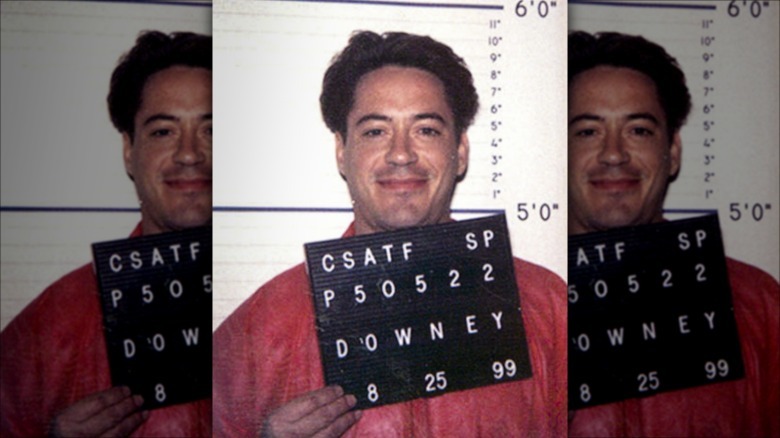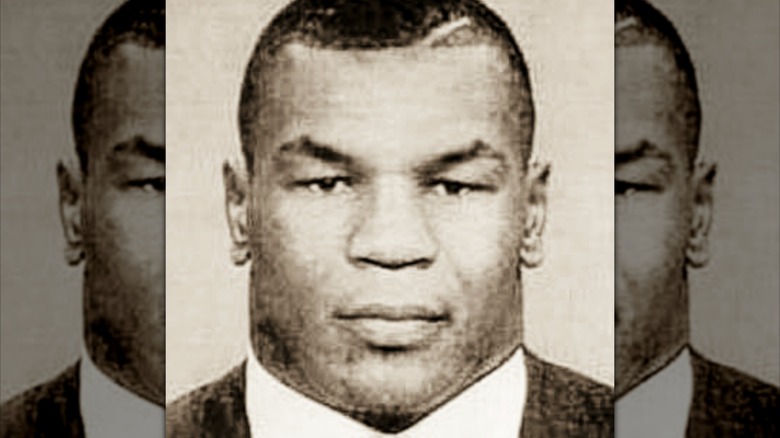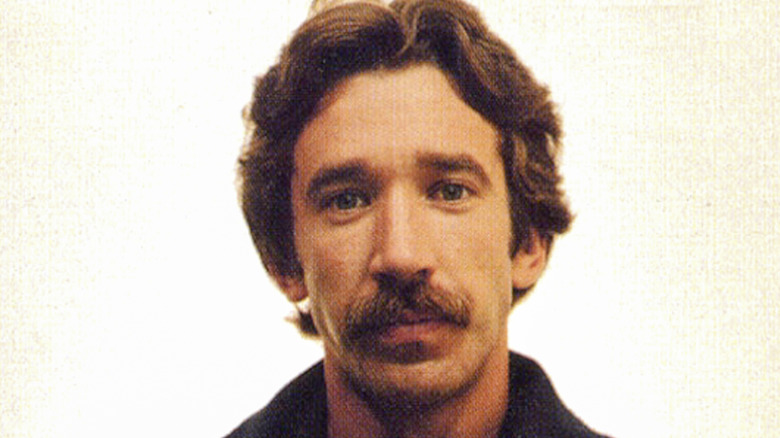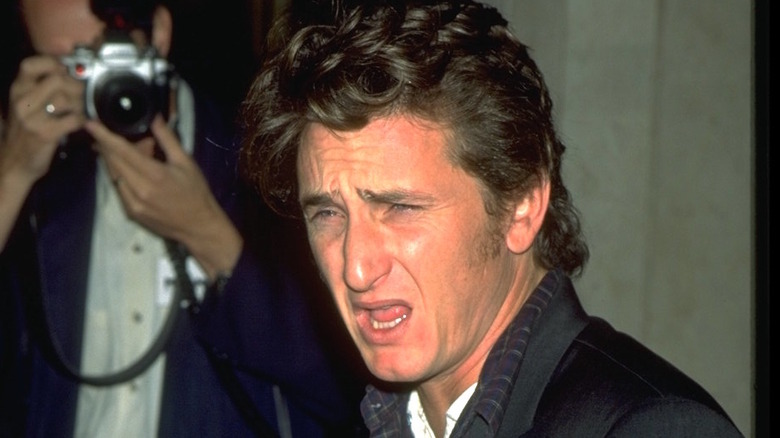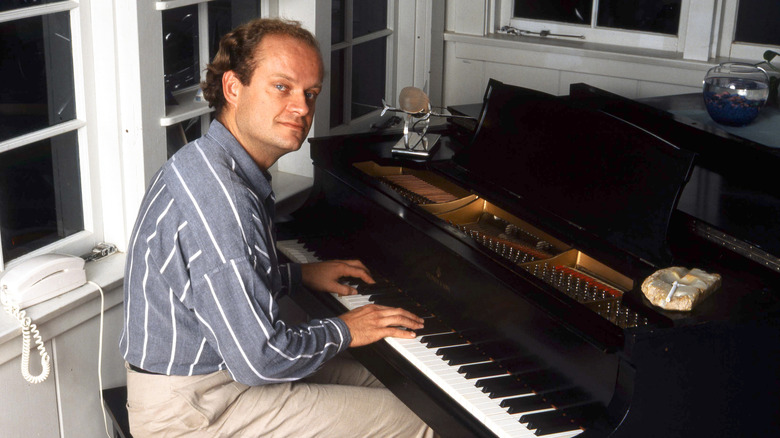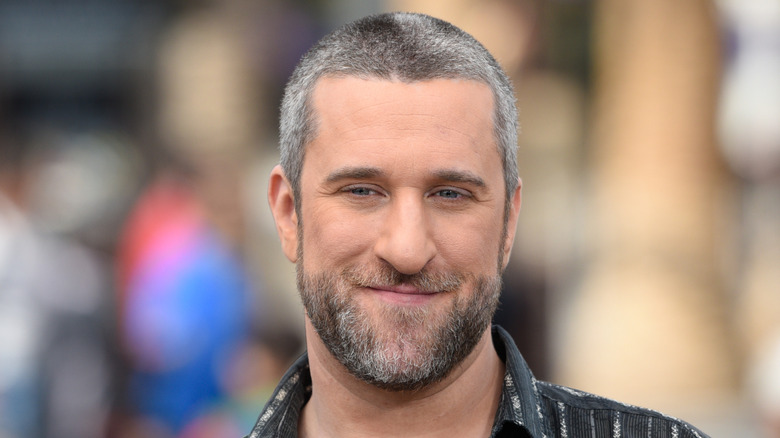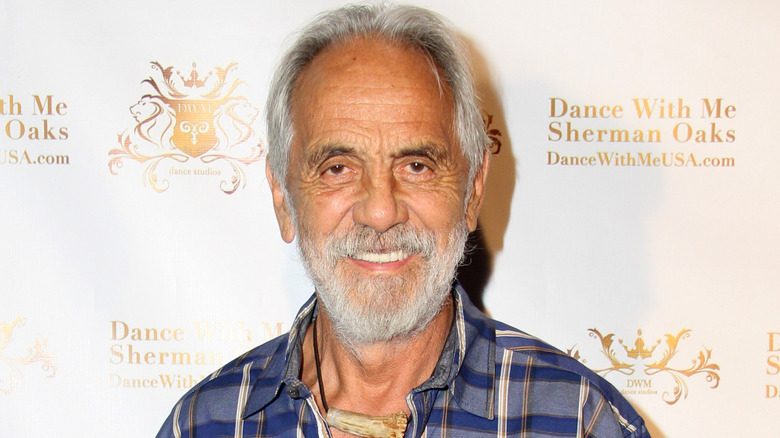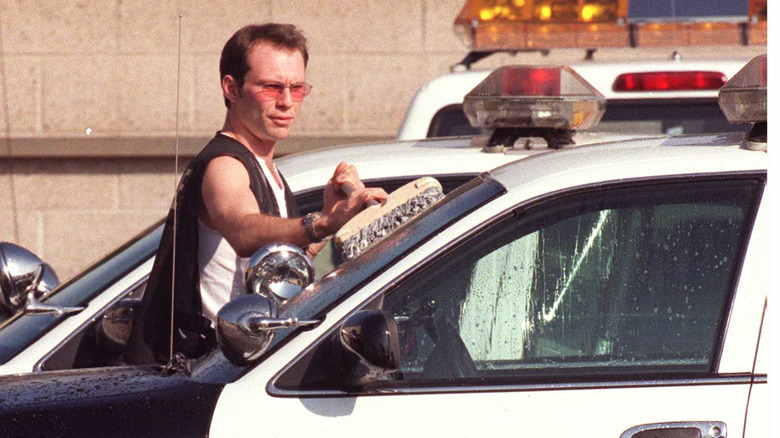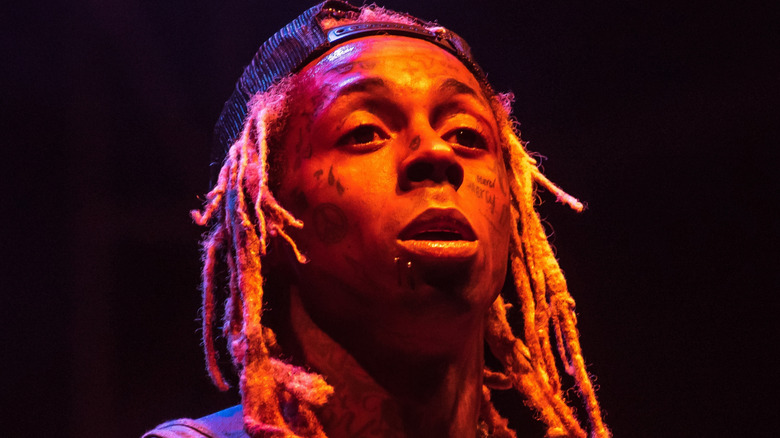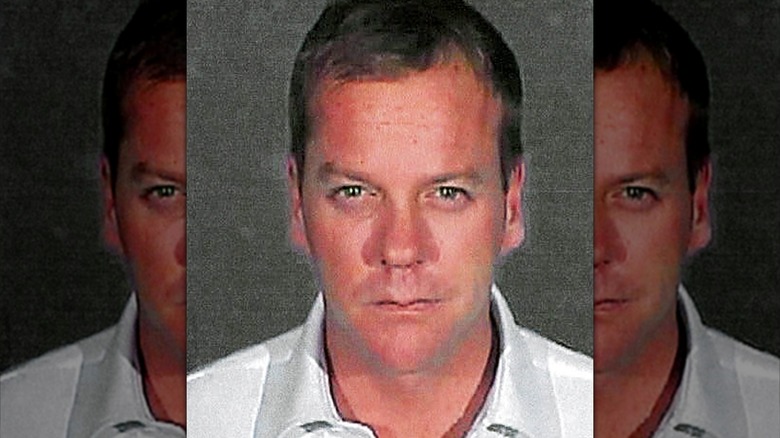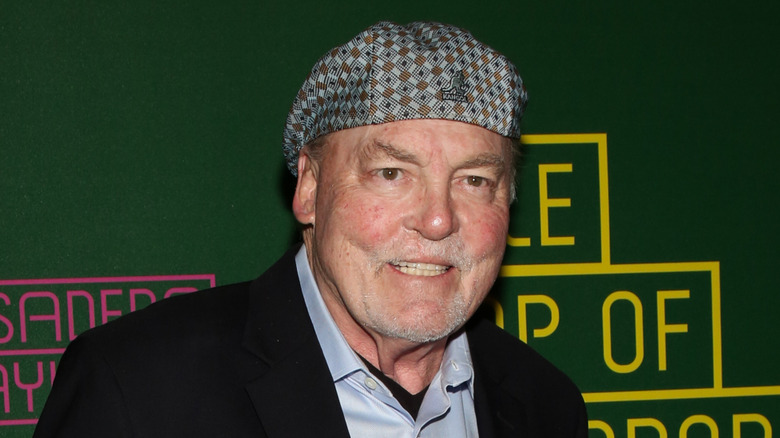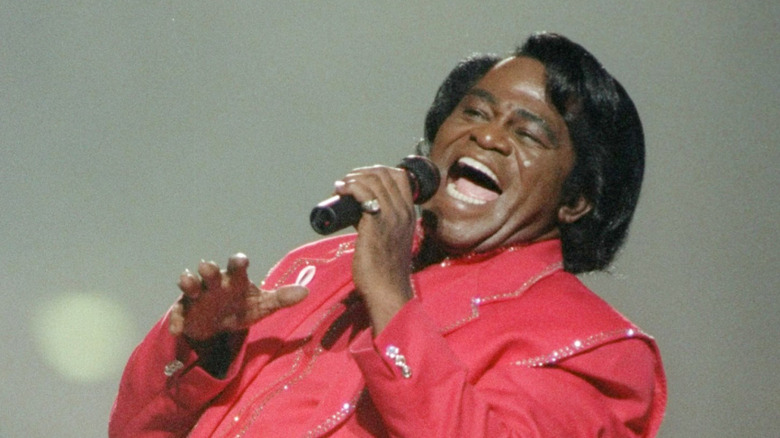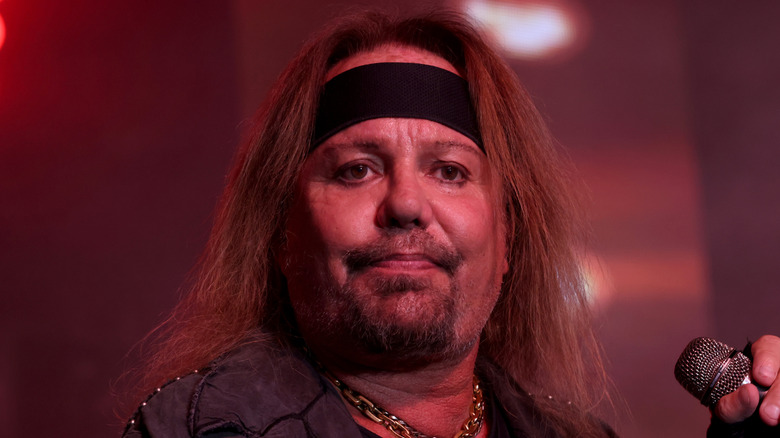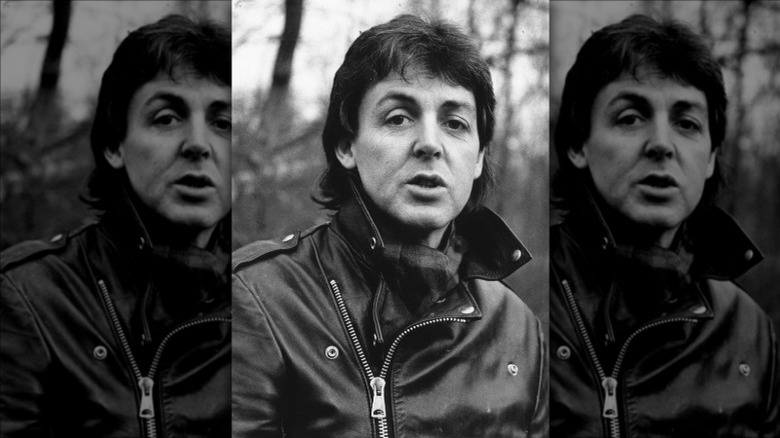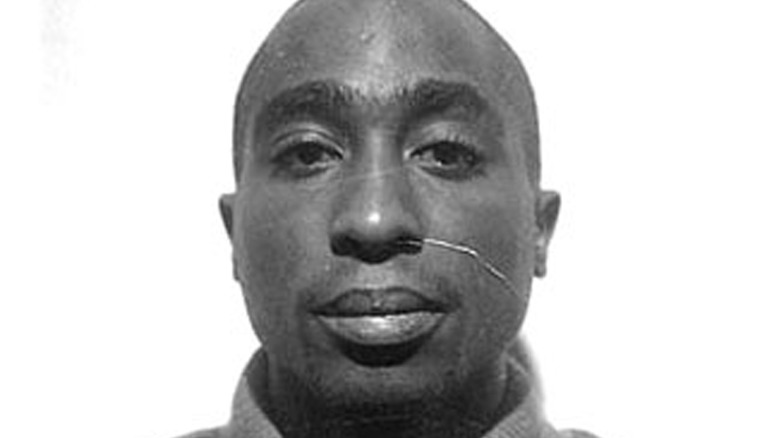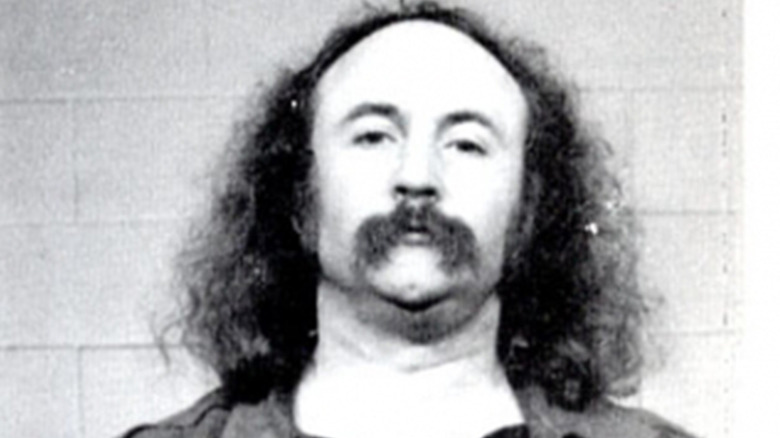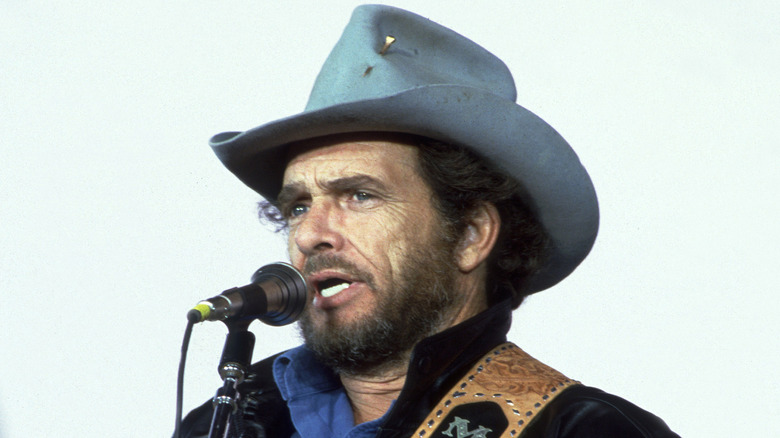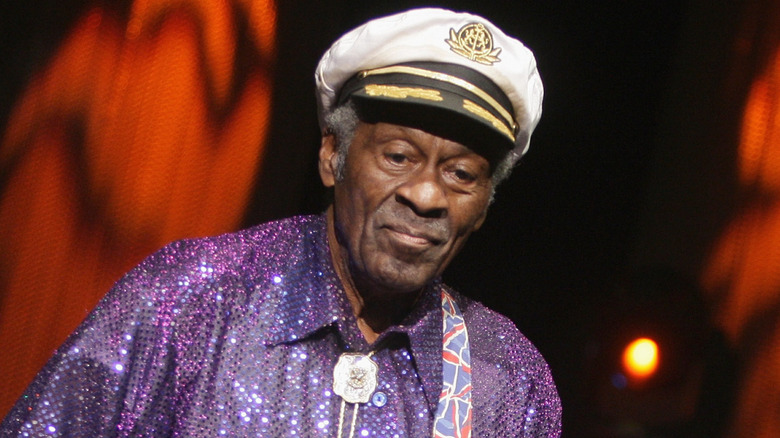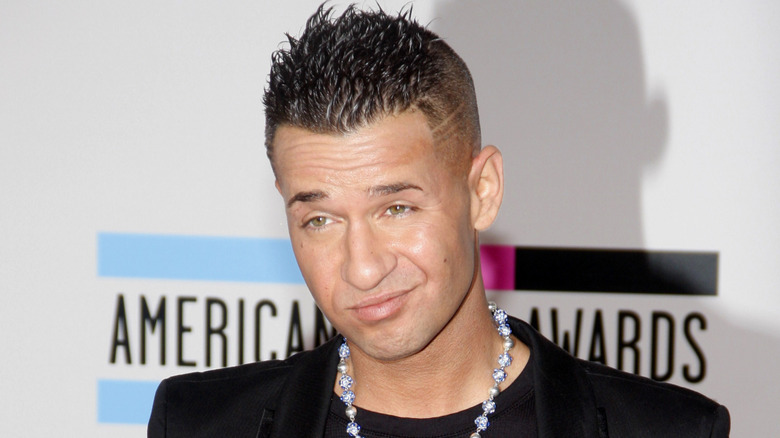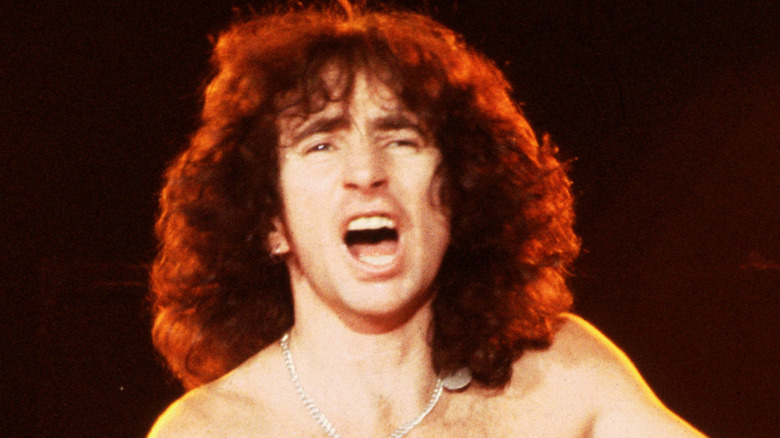Celebs You Forgot Spent Time Behind Bars
Apart from the high levels of fame, fortune, plaudits, and praise, celebrities are just like everybody else. And that means they make mistakes sometimes — even big, appalling ones so harmful that they're arrested and prosecuted. While it may seem like celebrities convicted of crimes receive punishment in the form of a fine they can easily afford, community service hours, or some kind of rehabilitation or therapy, judges and juries occasionally dole out the most severe punishments that the law may allow.
Then the actor, musician, or athlete serves their time, gets released, and begins the long and hard road back to dominance in their field and the good graces of the general public. Often, the felonious star steers clear of courthouses and prisons for the rest of their life. Before long, the world has completely forgotten about what was certainly a low point in the life of that celebrity. Here are some of the biggest stars out there, past and present, who once spent a significant period of time locked up.
Robert Downey Jr.
In June 1996, police in Malibu, California, pulled over a swerving, speeding pickup driven by actor Robert Downey Jr. A search uncovered heroin, cocaine, and an illegally concealed weapon — all arrestable offenses. Downey stood in front of a court to address those charges about a month later. Hours after that appearance, he was arrested again, having entered a home in Malibu and gone to sleep in a spare bedroom. Arrested for trespassing and being intoxicated with heroin, Downey was sent to a hospital's incarceration unit before being released.
A judge sentenced Downey to an in-patient drug rehabilitation program. The actor broke out of the facility and was imprisoned at the Los Angeles County Men's Central Jail for a period of nine days. After more court appearances, Downey was ordered into another six months of rehab, plus probation. When he violated his probation by failing to submit to drug tests, Downey received a sentence of 180 days in jail. Not counting the temporary releases he was granted to work on the movies "U.S. Marshals" and "In Dreams," Downey was in the Los Angeles County Jail for 113 days, including a spell in solitary confinement for his own safety after he was attacked by three prisoners. One condition of his release was more drug tests, which he didn't do, and in 1999, a judge sent him to the California Substance Abuse Treatment Facility and State Prison for a period not exceeding three years. The actor was released in 2000.
Mike Tyson
There hadn't been a mainstream superstar in boxing for a long time when Mike Tyson hit the circuit in 1985. "Iron Mike" won his first 37 bouts, which included 10 heavyweight titles and defenses. An undisputed champion by the age of 20, Tyson began to falter in 1990, when he lost the crown to Buster Douglas. He disappeared from professional boxing entirely between 1991 and 1995, because much of that time was spent defending himself in court and then residing in prison.
At the 1991 Miss Black America pageant held in Indianapolis, Tyson met an 18-year-old contestant, took her to his hotel room, and reportedly sexually assaulted her. Tyson stated that the encounter was consensual; the victim testified that she cried while Tyson laughed and committed the crime. A jury convicted Tyson in February 1992 on three counts, and the boxer received a 10-year sentence with four years suspended, to be served at the Indiana Youth Center. Tyson was imprisoned for a total of three years.
Tim Allen
Before he was one of the biggest stars of 1990s television as bumbling dad and DIY TV show host Tim Taylor on "Home Improvement," Tim Allen was a 1980s stand-up comic, honing the routines about gender roles and macho behavior that would inform "Home Improvement." And before that, Allen was a convicted illegal drug distributor.
In October 1978, 25-year-old Timothy Allen Dick was stopped and searched at the Kalamazoo-Battle Creek International Airport in Michigan. He was found to be carrying 650 grams, or 1.4 pounds, of cocaine. That's an amount so large that it implies the intent to distribute, and Allen pleaded guilty to a federal charge of drug trafficking. The crime was of such severity that he could have been sentenced to life behind bars. Instead, he made a deal with prosecutors: He turned state's evidence and passed along the names of his drug trade associates. In return, Allen's term was reduced to three to seven years. Following 28 months in the Federal Correctional Institution in Sandstone, Minnesota, Allen was paroled.
Sean Penn
Now a two-time Academy Award-winning actor best known for his thoughtful portrayals of complex characters as well as his international humanitarian efforts, Sean Penn burst onto the scene in the 1980s as an intriguing performer who, outside of work, couldn't seem to stay out of trouble. In 1987, Penn was arrested and ultimately declined to even argue a charge that he'd struck a man at a Los Angeles nightclub, believing the individual had kissed Penn's then-wife, Madonna. Penn got off with a $1,700 fine and a year of probation. Several months later, Penn was found to be in violation of his probation because of another violent outburst. Between shooting takes of the movie "Colors" in Venice Beach, California, extra Jeffrey Klein took some photographs of Penn and co-star Robert Duvall. Penn took offense and cursed and spat at Klein. The extra spat back at him, prompting Penn to repeatedly punch Klein in the face; crew members and other actors had to remove Penn from the situation. Around the same time, Penn was stopped by police after driving through a red light, and he plea-bargained what would have been a drunk driving charge down to a reckless driving count.
For the back-to-back incidents, a judge sentenced Penn to 60 days in Los Angeles County Men's Central Jail, along with an extension of his parole to two years and an order to attend six months of therapy sessions to receive anger management training.
Kelsey Grammer
Kelsey Grammer's big break came when he joined the cast of NBC's "Cheers" in its third season in 1984, portraying snooty and uptight psychiatrist Dr. Frasier Crane, a role he played for decades across that series and the hit spin-off "Frasier" and its reboot. Throughout his first Frasier Crane era, Grammer contended with substance abuse issues. In 1987, he was arrested in Southern California on a drunk driving charge, and he avoided prison time by entering a no-contest plea and agreeing to complete an alcohol rehab program. Grammer neglected to do that, and after a judge issued a warrant for the actor's arrest in 1990, he was sentenced to 30 days behind bars and 10 days of picking up garbage on the side of a highway.
Several weeks after he learned he'd spend a month in jail, Grammer stood before a judge regarding another legal matter. He was ultimately sentenced to 90 days of house arrest for not completing a drug rehabilitation program, a caveat of a plea deal for a cocaine possession arrest.
Dustin Diamond
A one-hit wonder of a child star whose death flew under the radar in 2021, actor Dustin Diamond was famous for exactly one thing. From 1988 to 2000, he played awkward nerd genius Samuel "Screech" Powers across four separate entries and two TV movies in the "Saved by the Bell" sitcom universe. In the 21st century, Diamond was more likely to appear on reality TV shows or find himself in trouble with the law than he was to land acting gigs. Police in Ozaukee County, Wisconsin, arrested Diamond for an incident that occurred on Christmas Day 2014. Diamond allegedly stabbed and wounded a man in a bar fight with a folding knife, later found in the actor's SUV. Among the charges Diamond faced: second degree reckless endangerment, disorderly conduct, and carrying a concealed weapon.
Convicted of the second two misdemeanors and cleared of the first felonious charge in 2015, Diamond was sentenced to four months in jail and was paroled after three months of incarceration. In May 2016, Diamond briefly returned to jail after authorities cited a parole violation, the nature of which was not publicly disclosed.
Tommy Chong
As half of the comedy duo Cheech and Chong, Tommy Chong virtually invented marijuana-based pop culture and stoner comedy, recording a string of LPs in the 1970s and starring in multiple drug-centered movies, including "Up in Smoke" and "Nice Dreams." Chong's persona, which he carried on into other TV shows and films, was that of an aging hippie who smoked so much marijuana as to be forever absent-minded, and he capitalized on that image by starting a business called Nice Dreams Enterprises. Established in an era before widespread legalized recreational marijuana, Chong's retail and online store sold glass pipes and other materials that were strongly suggested to be used in the act of smoking the forbidden drug. At least, that's what the Drug Enforcement Agency said Chong was doing with his pipes when they made the actor one of the 50 people it arrested in 2003 in relation to the "Operation Pipe Dreams" sting operation.
Chong entered a guilty plea on the drug charges and was convicted and sentenced to a nine-month term in federal prison. He wasn't paroled early, but his time behind bars wasn't terribly unpleasant. "There's no punishment in the federal prison," Chong said on the podcast "It Happened in Hollywood" (via The Hollywood Reporter). "You get a computer. You get a nice comfortable cubicle."
Christian Slater
A teen idol of the 1980s and early 1990s, Christian Slater had a reputation as a Hollywood troublemaker. While on-screen he played miscreants, rebels, and ne'er-do-wells in movies like "Heathers," "Pump Up the Volume," and "Young Guns II," in real life he amassed a rap sheet full of serious crimes, and some of those charges would result in prison time.
In two different episodes in 1988 and 1989, Slater was arrested for driving while intoxicated. In the second incident, Slater tried to flee from police. When cornered in an alley in West Hollywood, he reportedly kicked a member of the police force. A no-contest plea to drunk driving and evading arrest charges allowed prosecutors to drop other charges, and Slater was sent to jail for 10 days. In August 1997, Slater got so rowdy at a Los Angeles apartment, liberally ingesting tequila and cocaine, that the hosts called the police. The actor had no recollection of his actions that night, which reportedly included punching one guest, biting another, kicking a custodian in the stomach, and then assaulting a responding police officer. For all of that, Slater spent 59 days in a California jail.
Lil Wayne
There really wasn't a musician more impactful in the late 2000s than rapper Lil Wayne. His album "Tha Carter III" was the No. 1 selling LP of 2008, and it won the Grammy for best rap album; the single "Lollipop" topped the pop chart; and President Barack Obama identified himself as a fan. Through it all, Lil Wayne (also known as Dwayne Carter Jr.) dealt with the shadow of legal issues.
After he headlined a concert in July 2007, police in New York reportedly smelled marijuana smoke coming from Lil Wayne's tour bus, where they discovered a handgun they claimed was the property of the rapper. In October 2009, he entered a guilty plea to a count of felony gun possession. In March 2010, Lil Wayne went to prison to begin a one-year sentence. Weeks before his scheduled release, the rapper was sent to solitary confinement after guards found banned audio equipment in his cell at the Rikers Island facility outside New York City. All told, Lil Wayne was behind bars for eight months.
Kiefer Sutherland
Going all the way back to his first major roles in 1980s classics like "The Lost Boys" and "Stand By Me," Kiefer Sutherland usually plays intense characters, generally complex anti-heroes or abundantly evil bad guys. He's also very open with the world about his personal failings and mistakes. "The only bad things that have ever happened to me in my life have been because I like to go to bars and have drinks with my friends," he told "The Jess Cagle Interview" in 2016 (via People). Over the past four decades, Sutherland has amassed a rap sheet made up primarily of charges related to drunk driving arrests. For a 1989 arrest for DUI and carrying a loaded concealed weapon, Sutherland avoided jail time with a no-contest plea to a count of alcohol-related reckless driving. Four years later, stopped while driving while intoxicated again, Sutherland chose to fulfill a 211-hour community service requirement instead of a 12-day jail term.
In the 2000s, Sutherland ran afoul of the law for drunk driving again, and in 2004 he got probation, a fine, and court-ordered rehab after a no-contest plea. While still on probation for that case in 2007, Los Angeles police again nabbed Sutherland, who failed a field sobriety test after he was caught making an unlawful U-turn in Beverly Hills. That landed him behind bars, and the actor spent 48 days in the Glendale City Jail in the winter of 2007-2008.
Mark Wahlberg
Mark Wahlberg was raised in the Boston suburb of Dorchester, Massachusetts, where, before he was pop-rapper Marky Mark or an actor, he committed a series of violent hate crimes. In 1986, the attorney general's office of Massachusetts lodged a civil action against 15-year-old Wahlberg and two others for harassing and attacking three Black children. Wahlberg and his cohort yelled racial epithets at the children, threw rocks at them, and then menacingly gave chase on their mopeds. The trio allegedly committed similar acts the next day targeting one of the same victims when they encountered him on a school field trip.
Wahlberg avoided prison for those acts but would be sent behind bars two years later. In 1988, Vietnamese man Thanh Lam exited his car in Dorchester and was approached by Wahlberg, who proceeded to hurl racist language and then beat him about the head with a very large stick. Wahlberg beat Lam so severely that the stick broke and Lam required hospitalization. Later that day, Wahlberg assaulted another Vietnamese individual, Hoa Trinh, punching him in the eye. Arrested on suspicion of attempted murder, Wahlberg readily admitted the attack. He entered a guilty plea for the lesser charge of felony assault and was sent to prison for 45 days.
Stacy Keach
Stacy Keach made a career out of playing tough guys and heavies, and in early 1984 he began starring as a hard-boiled private eye on "Mickey Spillane's Mike Hammer." Just a few months into the run of the show, Keach flew from TV miniseries production in France to London for a "Mike Hammer" soundtracking session. He reportedly brought along a sizable personal stash, about 1.3 ounces, of cocaine. Keach had attempted to hide the drugs in a can of shaving cream.
Arrested by police at Heathrow Airport, Keach and his assistant, Deborah Steele, were both charged with the crime of importing cocaine. Released but ordered to return for a trial, Keach pleaded guilty to the crime and was sentenced in London's High Court to nine months in prison. He began serving the term right away, after a quick appeal was dismissed by a lord chief justice, interrupting production on "Mike Hammer."
"I think subconsciously I was hoping to get caught," Keach later told Fox News about his behavior. "Looking back, it was the best thing that ever happened to me. It saved my life actually."
James Brown
Before and after he became the Godfather of Soul, the electric showman and soul and rock pioneer James Brown went to prison. Raised in the countryside of South Carolina, Brown went to a juvenile detention facility for the first time when he was a teenager, set to serve eight years (but paroled after three) on charges of breaking into vehicles.
About 40 years later, Brown once again saw the inside of a prison cell. In 1987, Brown kept an office in Augusta, Georgia, and one day invaded the insurance company's space next door, brandishing a shotgun and complaining that unauthorized parties had been allowed the use of his restroom. Staff called police, and Brown fled, forcing authorities to chase him into South Carolina. After police shot out his front tires and Brown drove on his truck's rims for several miles, he was finally detained. Charged with fleeing police, presenting a deadly weapon where people had congregated, and driving under the influence of drugs — Brown was on PCP at the time — he was sentenced to six years in the State Park Correctional Center of South Carolina. Entering in December 1988, Brown was paroled in February 1991.
Vince Neil
By 1984, Mötley Crüe had a reputation as one of the hardest-drinking bands in the party-hard Los Angeles hair metal scene. One evening, singer Vince Neil had been just one celebrant enjoying a multi-day drinking binge at a beach house in the LA area, a party held by Mötley Crüe in honor of the American arrival of rising Finnish band Hanoi Rocks. On the night of December 8, 1984, the stocks of liquor were running low, and Neil, while extremely drunk, offered to drive to a store and pick up more booze. He brought along his new friend, Hanoi Rocks drummer Razzle, and set out. A winding road was too much for Neil to handle, and he swerved out of control and into two other cars.
One vehicle's driver, Lisa Hogan, broke three limbs, was left in a coma for three weeks, and developed a susceptibility to seizures; her passenger, Daniel Smithers, broke a leg and suffered brain damage. The other car's driver was left unhurt, and Neil cracked a couple of ribs. Razzle, however, died in the impact. Taken into custody on the scene by Torrance, California, police, Neil was charged with drunk driving and vehicular manslaughter and posted bail. In 1985, he was convicted. In addition to being ordered to pay $2.6 million to his victims and perform community service, Neil went to jail for 20 days for killing a man.
Paul McCartney
After the Beatles dissolved in 1970, Paul McCartney very quickly formed a new band, Paul McCartney and Wings. With seven albums and plenty of big hits like "My Love," "Band on the Run," and "Silly Love Songs," Wings was among the most popular bands of the 1970s, and it toured extensively throughout the decade. In January 1980, Wings took its sound to its big fanbase in Japan, where it planned to play 11 shows in just 13 days.
Upon his arrival in Tokyo on January 16, 1980, McCartney went through security and customs checks, and authorities searched his bag and discovered about half a pound of marijuana, which was very illegal in Japan at the time. Immediately arrested and detained for what looked to be an indefinite period of time, McCartney had his promoters cancel all of the Wings concerts in Japan. Meanwhile, McCartney awaited trial from his cell. If convicted, he could have been handed down the maximum sentence: seven years in a labor camp. Instead, after 10 days in jail, McCartney was released and deported.
Tupac Shakur
During the gangsta rap era of the early 1990s, performers vividly detailed their experiences with criminality and set off an industry war between two regional factions. Tupac Shakur, aka 2Pac, was among the most representative and successful of the West Coast contingent. His often bleak, sometimes celebratory songs about the contemporary Los Angeles underground came from a truthful place. Shakur was arrested on six occasions for violent and gun crimes between 1993 and 1995, but he faced a long prison term for only one of those incidents.
In a New York City hotel room in November 1993, Shakur and three others allegedly sexually assaulted a female fan. The rapper had been intimate with the woman on a previous occasion, leading to the defense's claim that the act was consensual. Despite Shakur's pleas of innocence to the court and in public interviews, he and one of his associates, road manager Charles Fuller, were found guilty of first-degree sexual abuse, while declared innocent on related charges of sodomy and weapons violation. Shakur was sentenced to 1.5 to 4.5 years in prison, of which he served nine months at the Clinton Correctional Facility of Dannemora, New York.
David Crosby
While he preached peace, understanding, and the anti-violence hippie lifestyle as a member of Crosby, Stills, and Nash, David Crosby also maintained a substantial interest in weapons. Following the gun-related murder of John Lennon in 1980 and fearing for his life, Crosby began carrying a handgun on his person for protection and self-defense purposes.
In March 1982, Crosby was driving to an anti-nuclear protest near San Diego when he ran his vehicle into a freeway divider. Crosby was intoxicated on cocaine at the time, and after he was pulled from the wreckage, police found more cocaine and Crosby's loaded gun. Charged with driving under the influence of cocaine, drug possession, drug paraphernalia possession, and having a concealed weapon, Crosby arranged for a plea deal, entering a guilty plea on a lesser count of reckless driving and accepting probation instead of prison. But then Crosby was arrested again, in Texas, with cocaine and a loaded pistol in his dressing room at the Dallas venue Cardi's. After a plea bargain-related rehab stint didn't work out — Crosby bailed after two days because he couldn't have musical instruments with him — he was sentenced to two concurrent prison terms: five years on the drug offenses, and three for the gun crimes. Crosby reported to prison in March 1986 and was released after five months.
Merle Haggard
Of the first generation of the bad boys who started the outlaw country movement, only Merle Haggard could claim true convicted criminal status. The tragic real-life story of Haggard led to some of the most gritty and enduring country music standards, like "Mama Tried," "The Bottle Let Me Down," and "Okie From Muskogee," and he took his aspirations of musical stardom seriously after finding inspiration while imprisoned. After a series of youthful crimes and an expulsion from school, 14-year-old Haggard was sent to jail for two weeks after stealing a car with a friend.
For repeated school truancy, he was sent to a labor camp and then a highly secured juvenile detention facility; he escaped from both. The run of small crimes and incarcerations continued, including a nine-month spell in California's Ventura County Jail for auto theft, until December 1957, when Haggard tried to rob a Bakersfield diner. He thought the restaurant was closed when he tried to bust open a back door lock and was chased off by the owner. Escaping from the Bakersfield jail after his arrest, Haggard was re-apprehended and sentenced to three years in the legendarily fearsome San Quentin State Prison. While an inmate, Haggard got to attend a concert given by Johnny Cash, which inspired him to get back into the music in which he'd dabbled. He gave guitar lessons to other prisoners and then pursued music as a profession upon his parole in 1960.
Chuck Berry
One of the very first rock 'n' roll stars, Chuck Berry ran up a bunch of influential hits in the 1950s, like "School Day," "Johnny B. Goode," and "Sweet Little Sixteen." By the end of the decade, Berry wasn't topping the charts much anymore, and he parlayed some of his fortune into owning a nightclub in St. Louis. During a trip to Juarez, Mexico, in 1959, he reportedly met 14-year-old Janice Escalanti in a bar and offered her a job in the hatcheck room at his establishment. Berry took Escalanti back to St. Louis but eventually fired her from the gig. Escalanti then went to the St. Louis police, alleging that Berry sexually assaulted her a total of 14 times during the journey from Mexico to Missouri and then at his home in St. Louis.
The court tried Berry on charges that he violated the Mann Act, a law passed in 1910 to fight interstate commercial sex work. It disallowed the transport of women across state lines ofr "immoral purposes," and it was only ever enforced selectively, particularly against Black men and celebrities. In March 1960, an entirely white jury convicted Berry and sentenced him to five years in prison. Six months later, Berry received a new trial on appeal, following racist comments made by the first judge. The conviction was held up, and Berry wound up in prison for two years.
The Situation
MTV stopped playing music videos because it brought in a lot of viewers and generated much cultural capital with full-length TV shows, such as reality programs like "Jersey Shore." One of the breakout stars of the 2009-2012 series, depicting the hard-partying lives of a young New Jersey friend group, was Mike Sorrentino, or as he preferred to be called, "The Situation." All those episodes featuring Sorrentino drinking, dancing, clubbing, and lifting weights generated a fortune for the documentary television subject, who was convicted of not paying the high tax bill on his astronomical earnings.
Sorrentino didn't file an individual tax return in 2011 but rather a fraudulent one via his personal corporation, Situation Nation, as a way to hide some of his wages. Sorrentino's accountant fessed up to executing part of the plan, and the reality star was indicted on a series of financial charges. In total, Sorrentino didn't pay, or helped conspire to not pay, income tax of $8.9 million. After entering a guilty plea to obtain a lighter sentence, Sorrentino received an eight-month federal prison sentence in 2018, along with a fine, community service, and probation. For most of 2019, Sorrentino resided at the Otisville Correctional Facility in Orange County, New York.
Bon Scott
Well before he ever joined Australian hard rock juggernaut AC/DC, a band with a tragic history that culminated in his death in 1980, singer Bon Scott was something of a wayward youth. By the age of 15 and living in Melbourne, Scott dropped out of school and took on a series of jobs as a scale mechanic, fisherman, and farm worker. He also got involved in the world of Melbourne's youthful crime gangs, and within months, he'd work his way up to a leadership position in one of those organizations. Also an active consumer of alcohol, marijuana, and amphetamines at the time, Scott took violent revenge on a police officer who beat up a member of his gang.
Scott wasn't imprisoned for that assault, but when he was 16 he was arrested, charged, and detained for a variety of crimes, including an illegal sexual act, lying to police about his name and address, escaping custody, and gasoline theft. In 1963, he was made a ward of Australia's Child Welfare Authority, which oversaw Scott as he served a sentence of one year at Riverbank Juvenile Detention Centre, a maximum security facility for offenders under the age of 18, in Perth.
If you or anyone you know needs help with addiction issues, has experienced a hate crime, or has been a victim of sexual assault, contact the relevant resources below:
- The Substance Abuse and Mental Health Services Administration website or contact SAMHSA's National Helpline at 1-800-662-HELP (4357).
- The VictimConnect Hotline by phone at 1-855-4-VICTIM or by chat for more information or assistance in locating services to help. If you or a loved one are in immediate danger, call 911.
- The Rape, Abuse & Incest National Network website or contact RAINN's National Helpline at 1-800-656-HOPE (4673).
